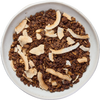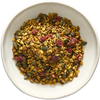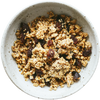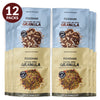
How an Anti-inflammatory Diet Can Help Manage Chronic Diseases
Reviewed By : Michele Porter - Nutritionist
Inflammation is the body's natural response to injury or infection. However, chronic inflammation can lead to many diseases, including heart disease, diabetes, arthritis, and cancer. The good news is that adopting an anti-inflammatory diet can help manage these diseases and improve overall health. In this article, we will explore the link between inflammation and diseases and provide information on how foods with anti-inflammatory properties can help manage these conditions.
Diseases managed by anti-inflammatory diet
Chronic inflammation can lead to various health issues. By eating anti-inflammatory foods and avoiding pro-inflammatory ones, we can manage certain health conditions as follows:
- Heart diseases
- Diabetes
- Arthritis
Heart diseases
Heart disease is the leading cause of death globally, with more than 17 million deaths yearly due to cardiovascular diseases. Heart diseases, including coronary artery disease, heart failure, arrhythmias, and heart valve problems result from chronic inflammation. Chronic inflammation is a significant risk factor for heart disease as it can cause plaque buildup in the arteries, leading to atherosclerosis.
Fatty fish such as salmon, mackerel, and sardines are high in omega-3 fatty acids, which can help lower triglycerides, reduce inflammation, and decrease the risk of arrhythmias. Whole grains such as oatmeal, brown rice, and quinoa are rich in fiber, which can help reduce LDL cholesterol levels and lower the risk of heart disease. Seeded Omega and Millet Crackers is a crisp savoury, anti-inflammatory, low glycaemic snack that helps to maintain steady blood sugar, offering a wealth of general health benefits.
Several studies have shown that an anti-inflammatory diet can reduce the risk of heart disease. One such study published in the British Journal of Nutrition found that a Mediterranean-style diet rich in fruits, vegetables, whole grains, nuts, and fish can lower the levels of inflammatory markers such as C-reactive protein (CRP) and interleukin-6 (IL-6) in the body. Studies also found that the participants who followed the Ayurveda based diet had a lower risk of heart disease than those who followed a typical Western diet.
Diabetes
Diabetes is another disease that is closely linked to inflammation. Type 2 diabetes is characterised by insulin resistance, where the body's cells become resistant to the effects of insulin. Inflammation can cause insulin resistance by impairing insulin signalling pathways. An anti-inflammatory diet can help manage diabetes by reducing insulin resistance and improving glucose control. Dishes like Burrito bowl are best options to have your diabetes in control. It is a mix of healthy and fresh veggies such as courgettes, mushrooms, carrots, onions, and cherry tomatoes in the mix, with brown basmati rice and black beans as the base is a great Mexican bowl loaded with vegetables. Studies have shown that a diet high in fruits and vegetables can reduce the risk of heart disease, diabetes, arthritis, and cancer. Eating whole grains like basmati rice is linked to a lower risk of heart disease. Whole grains help to reduce blood cholesterol levels.
Also, studies show that a low-glycemic index (GI) diet, which is high in fibre, whole grains, fruits, and vegetables, can reduce inflammatory markers and improve glycemic control in people with type 2 diabetes.
Arthritis
Arthritis is a group of inflammatory conditions affecting joints and connective tissues. Osteoarthritis, the most common form of arthritis, is caused by the breakdown of cartilage in the joints. Rheumatoid arthritis, on the other hand, is an autoimmune disease where the body's immune system attacks the joints. An anti-inflammatory diet can help manage arthritis by reducing inflammation in the body. Fatty fish, such as salmon and mackerel, are rich in omega-3 fatty acids, which have been shown to reduce inflammation and improve joint health. Berries are rich in antioxidants and can help reduce inflammation in the body, which can help manage the symptoms of arthritis.
Researches show that diet rich in fruits, vegetables, whole grains, and fish can reduce inflammation and improve joint function in people with rheumatoid arthritis. Another study found that a Mediterranean-style diet can reduce the risk of developing osteoarthritis.
Cancer:
Cancer is a group of diseases characterised by the uncontrolled growth and spread of abnormal cells. Chronic inflammation is a significant risk factor for cancer as it can promote DNA damage and cell mutations. An anti-inflammatory diet can help manage cancer by reducing inflammation and promoting cell health. Natural anti-inflammatory meals like Ayurvedic Rasam, a soup with Red Lentils which is rich in fibre, magnesium, and folate help to support a healthy heart, Curcumin, is an active ingredient in turmeric in this rasam, which has potent biological properties with the ability to reduce the risk of cancer and improve the liver.
A study published in the journal Cancer Epidemiology Biomarkers & Prevention found that a diet high in fruits, vegetables, and whole grains can reduce the risk of developing certain types of cancer, including breast, prostate, and colon cancer.
Now that we have explored the link between inflammation and disease, and some of the best anti-inflammatory foods that can help fight inflammation, you can begin your healthy lifestyle by following platforms like Foodhak. From all the data and scientific studies, eating healthy is a way to stay away from silent diseases like diabetes. At Foodhak you have numerous healthy options to choose from on the menu. Many ingredients are alkaline, have anti-inflammatory properties, and promote healthy biomarkers like cholesterol and blood glucose levels. Therefore, helping you live in an era of preventative medicine. Stay hale and healthy with Foodhak!
Also read: Anti-Inflammatory Foods, Anti-inflammatory diet meal plan
























